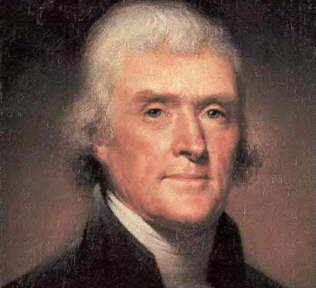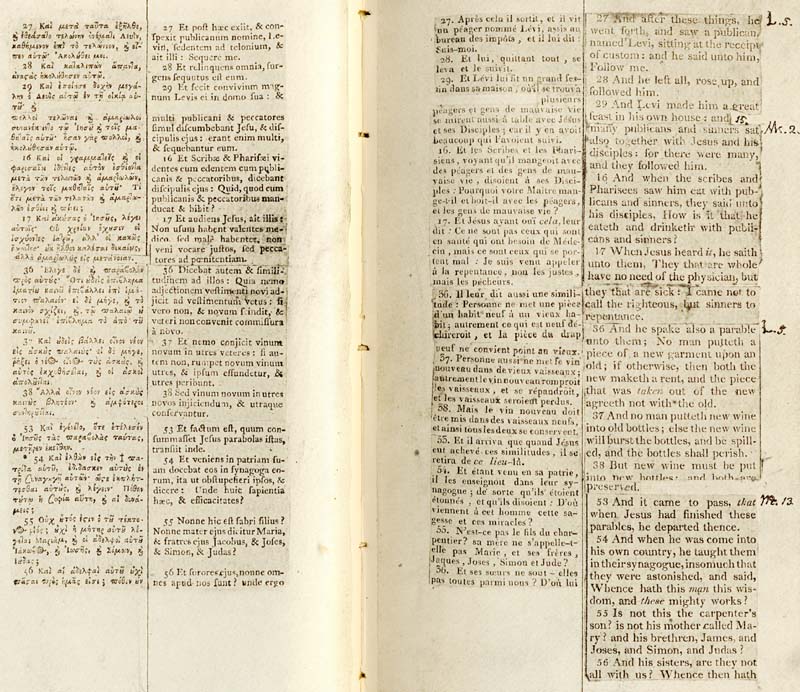|
The Jefferson Bible
When establishing the United States, Thomas Jefferson and America's other Founding Fathers were inspired by the revolutionary ideas of 18th century Europe, a period known as the Enlightenment. Instead of relying on traditional faith and institutions, Europeans began to use reason and science as their guide. This new way of thinking would eventually break the chains of European monarchy and the theology that supported it. During the Enlightenment period, religious dogma was seriously questioned. Thomas Jefferson was one of America's a leading critics of Judeo-Christian orthodoxy. Indeed Jefferson's skepticism was so profound that he could not be described as a Christian in the conventional meaning of the word. Jefferson did not believe in the divinity of Christ, nor did he believe that Christ had performed miracles. Jefferson did, however, believe in a "superintending power" in the universe, and that Jesus was a great reformer and moral leader. In one of his many letters to John Adams, Jefferson remarked:
When Jefferson ran for the office of U.S. President, he correctly predicted that his opponents would use his writings in attempt to smear him. In the tumultuous election of 1800, New England's clergy, along with the conservative Federalist Party, vilified Jefferson as a "howling atheist" and "infidel." Toward the end of his life, Jefferson took Greek, Latin, French, and English extracts of the New Testament and cut and pasted together his own version of the Bible. His goal was to eliminate what he regarded as distortions in the Gospels. Jefferson believed that the New Testament was written by unlearned apostles who often misunderstood Jesus and misrepresented his teachings. Jefferson felt that his edited version of the Bible best expressed the moral code of what Jesus really taught.
Jefferson Quotes on Religion: "[A] short time elapsed after the death of the great reformer of the
Jewish religion, before his principles were departed from by those who
professed to be his special servants, and perverted into an engine for
enslaving mankind, and aggrandizing their oppressors in Church and State;
that the purest system of morals ever before preached to man, has been
adulterated and sophisticated by artificial constructions, into a mere
contrivance to filch wealth and power to themselves; that rational men not
being able to swallow their impious heresies, in order to force them down
their throats, they raise the hue and cry of infidelity, while themselves
are the greatest obstacles to the advancement of the real doctrines of
Jesus, and do in fact constitute the real Anti-Christ." "[The apostle] Paul was the great Coryphaeus, and first corrupter of the doctrines of Jesus." "It is between fifty and sixty years since I read it [the Book of
Revelation],
and I then considered it merely the ravings of a maniac, no more worthy
nor capable of explanation than the incoherencies of our own nightly
dreams." "But it does me no injury for my neighbor to say there are twenty gods
or no God. It neither picks my pocket nor breaks my leg." "Millions of innocent men, women and children, since the introduction of
Christianity, have been burnt, tortured, fined and imprisoned; yet we have
not advanced one inch towards uniformity. What has been the effect of coercion? To make one-half the world fools and the other half hypocrites. To support roguery and error all over the earth." "The common law existed while the Anglo-Saxons were yet
pagans, at a time when they had never yet heard the name of Christ
pronounced or knew that such a character existed." "For we know that the common law is that system of law which was
introduced by the Saxons on their settlement of England, and altered from
time to time by proper legislative authority from that time to the date of
the Magna Charta, which terminates the period of the common law.... This
settlement took place about the middle of the fifth century. But
Christianity was not introduced till the seventh century; the conversion
of the first Christian king of the Heptarchy having taken place about the
year 598, and that of the last about 686. Here then, was a space of two
hundred years, during which the common law was in existence, and
Christianity no part of it.... That system of religion could not be a part
of the common law, because they were not yet Christians." "His [John Calvin's] religion was demonism. If ever man worshiped a false God, he did. The being described in his five points is ... a demon of malignant spirit. It would be more pardonable to believe in no God at all, than to blaspheme him by the atrocious attributes of Calvin." "Fix reason firmly in her seat, and call to her tribunal every fact,
every opinion. Question with boldness even the existence of a god;
because, if there be one, he must approve the homage of reason rather than
of blind-folded fear. Do not be frightened from this inquiry by any fear
of its consequences.... If it end in a belief
that there is no god, you will find incitements to virtue in the comfort
and pleasantness you feel in its exercise and in the love of others it
will procure for you." |

